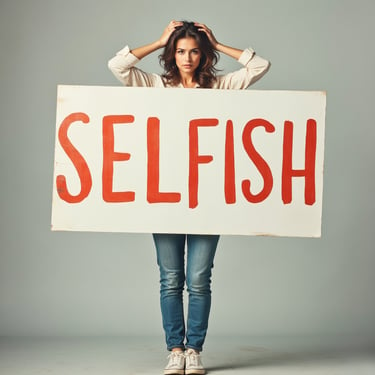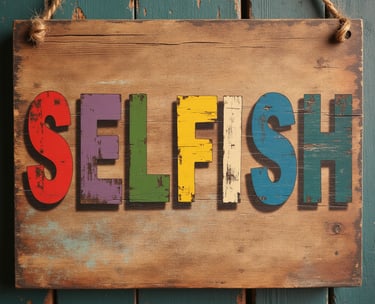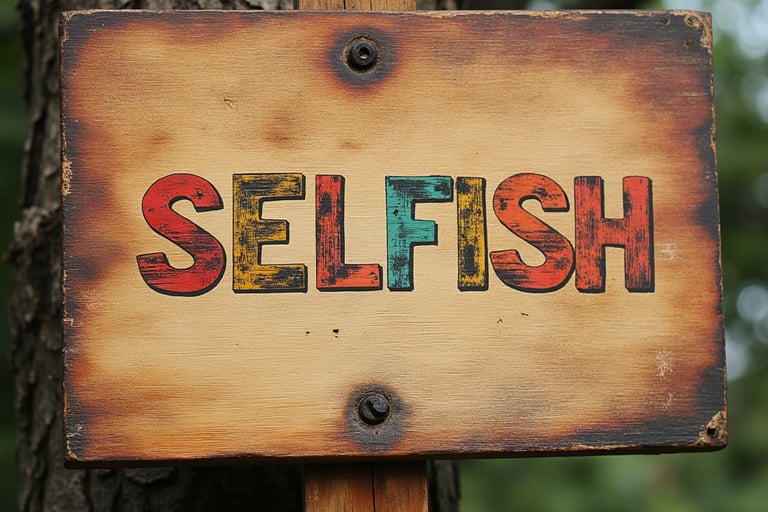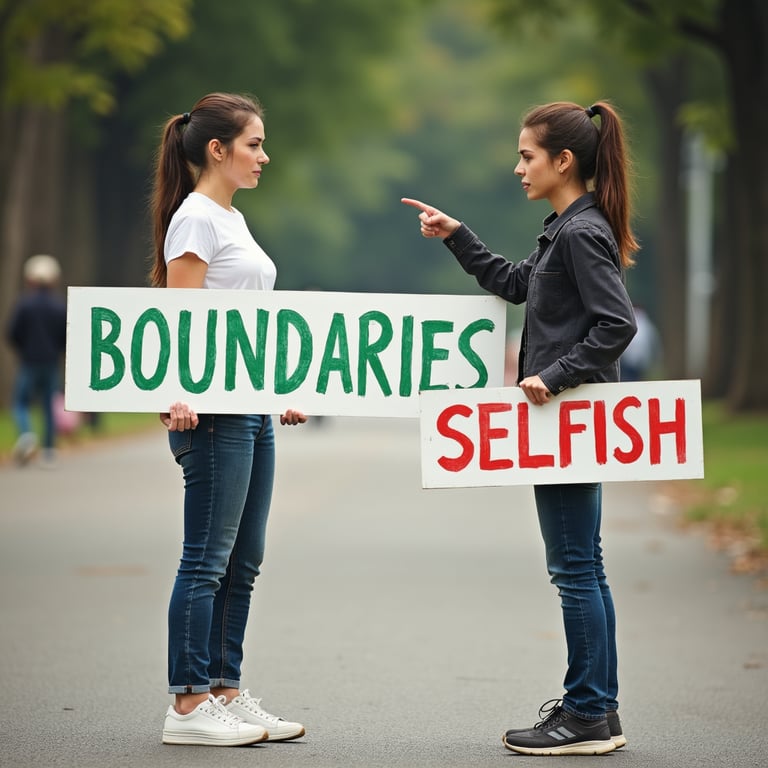
Amarae Inspirational
Are You Selfish When You Set Boundaries?
Have you ever said no to someone and instantly felt that guilty knot in your stomach? That little voice whispering, “Am I being selfish?” I’ve been there more times than I can count, and for years I bent over backwards trying to avoid that label. But let’s cut to the chase: setting boundaries is not selfish. But oh, how people love to throw that word at you when your “no” doesn’t serve their “yes.” I’ve lived it, I’ve been called it, and I’ve decided it’s time to talk about it, because being direct and honest can make people uncomfortable, but it doesn’t make you wrong!
Rosita
9/28/20258 min read


Are you selfish when you are setting boundaries?
That is a question I’ve been confronted with more times than I can count, and to be honest, I’ve asked it of myself too.
For a long time, I struggled with where the line is between looking after yourself and being considered selfish by others.
And maybe that’s why I want to tell you my story, because I know I’m not the only one who has been made to feel guilty simply for saying no.
My name is Rosita, and I like to think of myself as a straightforward person.
I don’t enjoy beating around the bush, I don’t like unnecessary games, and if something is on my mind, I’d rather say it directly.
That doesn’t mean I want to hurt anyone.
I don’t wake up thinking: “Who can I upset today?” No, I actually try very hard to speak in a way that is respectful and not hurtful.
But here’s the problem: not everyone finds directness easy to deal with.
Over the years, I realized that people often misunderstood me. They took my honesty and clarity as rudeness, or worse, as intentional cruelty.
They thought that by saying something directly, I was disregarding their feelings or that I lacked respect. And because of that, slowly but surely,
I began toning myself down. I watered myself down piece by piece, just to avoid conflict.
But the more I did that, the more I noticed something painful: I wasn’t just holding back my personality, I was suppressing my values,
my sense of right and wrong, and even my identity.
While I always respected other people’s views and opinions, mine were not being respected in return.
And that’s not a comfortable place to be. In fact, it eats away at you. You begin to feel invisible, overlooked, and dismissed.
Well, I was born in 1963. I’ve lived long enough now that I’m not willing to play that game anymore. I’ve reached the age where I don’t care nearly as much about how other people think I should behave or who they think I should be. Honestly? I’m done with that. At some point, you get tired of squeezing yourself into boxes that don’t fit, all for the sake of making other people comfortable.
But here’s the catch: the moment you stop doing that, the moment you speak up or say no, people will often label you as selfish. That’s where this whole conversation starts. Is it selfish to set boundaries? Or is it actually the opposite?


I’ll give you an example.
Since the year 2000, my husband and I have been living in a different country from the one we were born in.
Moving abroad was a big step, and we knew it would come with changes. One of the things we expected was that people would want to come visit. So we talked about it in advance and agreed that our answer would always be polite, but firm: no thank you.
Now, that might sound harsh to some people, but let me explain.
These weren’t people who had shown any real interest in our lives when we still lived in Holland.
They weren’t the ones checking in, supporting us, or being part of our day-to-day. But the moment we moved abroad, suddenly we turned into a free holiday destination. They saw us as a cheap option, not as people with our own lives and needs. So we said no. And guess what? We were called selfish?!


That’s the part that really bothers me. Because here’s the thing: are you truly being selfish when you say no, or are you simply setting a boundary? It all depends on which side of the fence you’re standing on. If your “no” stops someone else’s convenience, it’s easy for them to call you selfish. But from your perspective, you’re just protecting your time, your space, and your peace.
Personally, I find directness refreshing. I actually appreciate it when people tell me exactly what they think or feel. If someone doesn’t like me, I’d rather they tell me than leave me guessing. It clears the air and prevents misunderstandings. It also opens the door to an honest discussion. But not everyone works that way.
I remember one situation in particular.
Someone told me they wanted to visit and bring a friend along. I didn’t know the friend personally, but I had been told that this person was going through a lot of emotional struggles and thought that the trip would help. My answer was immediate: no to bringing the friend.
At that point, I was already a professional card reader, a Reiki Master, and a teacher.
I loved my work, and I loved giving readings and offering Reiki.
But here’s the thing: those things are not freely available to anyone who shows up at my doorstep.
Like many people who work in healing, I give freely when I choose to give,
not when I’m pressured or cornered.
That’s an important difference. But once again, because I drew a line, I was called selfish.
And this is the pattern I see everywhere.


Boundaries almost always look selfish to the people who were benefiting from you not having any.
Boundaries don’t just appear in big life situations like moving countries or hosting visitors. They show up in the small, everyday choices too.
Saying no to a night out because you want a quiet evening at home.
Refusing to answer work messages late at night because that’s your time to rest.
Not loaning money to someone you know will never pay it back.
Declining a last-minute visit when you’re in the middle of something important, even if that “important” thing is just enjoying your own peace.
None of those things are selfish.
They’re simply you choosing to respect your own needs and limits. But selfishness?
That’s something entirely different.
Selfishness is eating your sandwich while your friend sits hungry next to you because they forgot theirs.
Selfishness is climbing on other people’s backs to get where you want to go, without caring who gets hurt.
Selfishness is taking, taking, and taking, without any thought for the impact on others.
Boundaries, on the other hand, are about protecting yourself while still respecting others. That’s a BIG difference.


One story from my working life really stuck with me. I once worked the late shift with five colleagues. Nobody else wanted those hours, but they suited us perfectly. As part of the job, we also had to work on rotation during weekends, including two Sundays a month.
The weekend shifts paid 150%, the Sunday shifts paid 200%, and if a Sunday happened to be a holiday like Christmas Day, the pay was even 300%.
Now, sometimes we asked others if we could swap shifts for personal reasons, birthdays, family visits, things like that. Most of the time, it worked out fine. But there were a few people who didn’t want to work Sundays because of their religion. And that was completely understandable. We respected it fully.
Once we knew, we stopped asking them altogether, because we didn’t want to put them in a position where they had to say no.
But one day, one of these colleagues came to us asking if they could take over our Sunday shifts because they needed extra money. Can you imagine? The very shifts they had refused for religious reasons, they suddenly wanted because it suited them financially. And when we said no, we were called selfish!
That moment was a real eye-opener for me.
It made me realize that the word selfish is often used when someone simply feels inconvenienced.


And that’s the core of it.
Too often, selfishness is confused with boundaries.
They are NOT the same. Selfishness is taking without regard for others. Boundaries are protecting your own well-being without disrespecting others.
Here’s another important thing I’ve learned: when you keep saying yes out of guilt or fear of judgment, you’re not actually being generous. You’re being dishonest with yourself and with the other person. Because a “yes” that you don’t mean isn’t a gift. It’s a sacrifice.
And sacrifices made with a heavy heart don’t serve anyone well.
They lead to resentment, and resentment is like a slow poison. It drains your joy, your creativity, and even your relationships.
Think about it: if you agree to something you don’t want to do, are you really helping?
Or are you just avoiding the discomfort of saying no? And then later, you’re left feeling drained, invisible, or even used. That’s not kindness.
That’s self-abandonment. This is why boundaries are not walls. They’re not about shutting people out or building barriers. They’re more like doors with locks.
You decide who comes in, when, and under what conditions. That clarity doesn’t damage relationships, it strengthens them.
With boundaries, there’s no guessing, no silent frustration, no pretending you’re okay when you’re not.
There’s honesty, and honesty is the foundation of any healthy connection.
What many people don’t realize is that boundaries are actually one of the most loving things you can set.
Why? Because when you protect your own energy, you have more to give. When you say yes, it comes from a place of fullness, not obligation.
That’s real generosity. And honestly, wouldn’t you rather receive from someone who is happy to give than from someone who is exhausted and resentful? Exactly!
That’s why I say: no, you are not selfish when you set boundaries. You are practicing self-respect and self-preservation.
You are protecting your peace, your time, and your energy. Selfishness takes from others. Boundaries protect yourself.
And those are two completely different things.
Of course, not everyone will see it that way. The people who benefited from your lack of boundaries will be the ones who resist when you start putting them in place. They may guilt you, accuse you of being rude, or try to shame you into changing your mind. But the truth is, they’re not upset because you’re selfish. They’re upset because they can no longer access your time, energy, or resources as freely as they used to. And that’s their discomfort, not your wrongdoing.
So here’s what I remind myself:
setting boundaries isn’t just about protecting myself, it’s about being honest in my relationships.
It’s about saying yes when I mean yes, and no when I mean no.
It’s about showing up authentically, without resentment, without hidden frustration, and without self-betrayal.
That’s not selfish. That’s integrity.
And if you’ve ever struggled with this, if you’ve ever been called selfish for saying no, or felt guilty for protecting your peace,
I want you to know you’re not alone.
This is something so many of us face. It’s not easy, but it is worth it.
Because at the end of the day, your well-being matters. Your voice matters. And your boundaries matter.
So the next time someone tries to make you feel guilty for saying no, take a deep breath and remind yourself: you are not selfish.
You are simply responsible for your own well-being. And that is something to be proud of.
And now I’d love to hear from you. Have you ever been called selfish just for setting a boundary?
Do you find it easy or difficult to say no when you need to?
Can you think of a time when setting a boundary gave you more freedom and energy to say yes to something better?
Share your story.
Rosita


Connect & Inspire
© 2025. All rights reserved.
Subscribe to our Newsletter
Good Times
Once every 2 months
